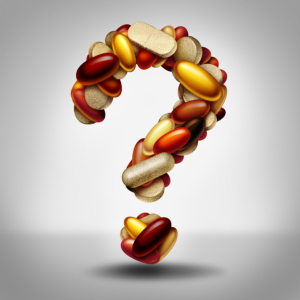Immunity Series: Glutamine
What is it?
Gluatmine is an important amino acid in the body. This amino acid exists in two different forms: L-gluatmine and D-gluatmine. They are very similar, but have different molecular structures. The form of glutamine in food and supplements is typically L-gluatmine.
What does L-glutamine do?
Glutamine serves as a building block for protein and proteins are needed for proper organ function. Glutamine is also an important part of the immune system as it supports the transport of substances in the blood and fights off viruses and bacteria. Glutamine aslo helps to maintain the integrity of the intestine and has an anti-inflammatory effect in the digestive tract.
What foods contain this nutrient?
- Eggs
- Beef
- Skim milk
- Tofu
- White rice
- Corn
- Cabbage
- Dairy
- Fish
- Beans
- Chicken
Should I supplement and how much should I take?
Because your body makes the supply of glutamine that it needs, there is often no need to supplement.
Glutamine is often prescribed to those who are hospitalized with a burn wound to shorten recovery time.
Glutamine is often marketed towards gym-goers, weightlifters or bodybuilders to replenish the glutamine stores that are lost during exercise, increase the ability to recover, and enhance performance. According to a 2014 study, the glutamine stores cannot be wiped out during exercise, and a 2019 study concluded that there are no performance benefits, so more research is needed to conclude the efficacy of a glutamine supplement on athletic performance.
If you are looking to supplement glutamine to enhance recovery and boost immune function, a study suggests a set dose between 20-30 grams daily.
How safe is it?
A safe starting dose for supplementation is generally 5g/day. Generally L-glutamine supplementation is safe, however if taken in too high doses side effects like vomiting, joint pain, hives and nausea may occur. Consultation with your healthcare provider is recommended to find the right dosage amount for you depending on your health status.
Bottom Line:
Most high protein foods contain gluatmine, so most people consume an adequate amount of glutamine through their diet. Those who are vegan or vegetarian may be at higher risk for consuming a lesser amount of glutamine. Glutamine is a nonessential amino acid, meaning that it is made naturally in our bodies. Glutamine helps to maintain gut health, regular organ function and fights off viruses and bacteria.
Want to learn more about your individual micronutrient status and nutrition needs?
Check out our nutrition programs to learn more.
References:
https://lpi.oregonstate.edu/mic/health-disease/immunity-in-brief
https://www.healthline.com/nutrition/glutamine#section7
https://jissn.biomedcentral.com/articles/10.1186/s12970-014-0061-8
https://www.sciencedirect.com/science/article/abs/pii/S027323000800010X?via%3Dihub
https://www.ncbi.nlm.nih.gov/pmc/articles/PMC5454963/




